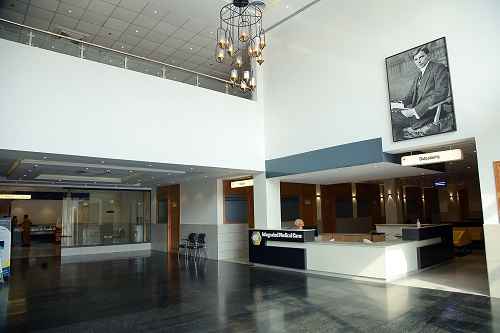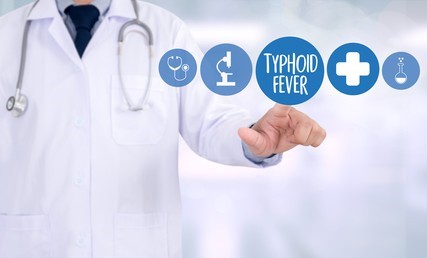- 11-Apr-23
The bacterium Salmonella typhi is the source of typhoid fever, a bacterial illness. It is more prevalent in places with poor sanitation and hygiene because it is typically transmitted through contaminated food or water. Blood or stool tests are typically used to identify typhoid fever and antibiotics are typically used to treat it in order to eradicate the bacteria. Proper food preparation and storage are a few preventive measures that should be observed along with good sanitation and hygiene habits. Additionally, there are vaccines for typhoid disease.
Typhoid Fever Meaning in Urdu:
بیکٹیریل اسہال ایک عام بیماری ہے جو ایک مخصوص قسم کے بیکٹیریا کی وجہ سے ہوتی ہے۔ علامات میں درد، بخار، درد، اور پیٹ میں درد شامل ہوسکتا ہے۔ ترقی پذیر ممالک میں یہ بیماری بچوں میں عام ہے جو آلودہ خوراک اور پانی سے پھیل سکتی ہے۔
Typhoid Symptoms:
The symptoms of typhoid fever can vary in severity and can take up to several weeks to develop after exposure to the bacteria. The following are some typical signs of typhoid fever:
- High fever: A sustained fever that can reach up to 104 degrees Fahrenheit.
- Headache: A persistent headache that can be severe.
- Weakness and fatigue: A feeling of weakness and fatigue is common, and it may be difficult to perform normal daily activities.
- Stomach pain: Pain in the abdomen, which can be severe, and can be accompanied by nausea, vomiting, or diarrhea.
- Loss of appetite: A loss of appetite is common, which can result in weight loss.
- Skin rash: A pink, flat rash that appears on the trunk of the body may develop.
- Confusion: In some cases, confusion or delirium can occur.
It is important to seek medical attention if you develop any of these symptoms, particularly if you have recently traveled to an area with a high incidence of typhoid fever.
Typhoid Fever Diagnosis:
Diagnosing typhoid fever involves a combination of medical history, physical examination and laboratory tests. A doctor will typically ask about recent travel history, exposure to contaminated food or water and any symptoms that you may be experiencing. Physical examination may reveal signs such as an enlarged spleen or liver, abdominal tenderness and a characteristic rash.Laboratory tests are usually required to confirm the diagnosis of typhoid fever. These may include:
- Blood tests: Blood tests are used to detect the presence of antibodies or bacteria in the bloodstream.
- Stool culture: A stool culture can detect the presence of the bacteria in the stool.
- Bone marrow culture: A bone marrow culture is a more invasive test that can be used if blood and stool tests are inconclusive.
- Urine culture: A urine culture can detect the presence of the bacteria in the urine.
If typhoid fever is suspected, treatment should be started immediately even before the results of laboratory tests are available to prevent the infection from worsening.
What Are the Stages of Typhoid Fever?
Typhoid fever symptoms can appear gradually over four phases. Antibiotics can prevent you from moving on to later stages if you receive therapy early.
Stage 1. Typhoid symptoms can appear anywhere between 5 and 14 days after coming into contact with S. Typhi. The first sign is an increasing temperature over a few days; this fever is referred to as "stepwise" because it increases gradually. At this point the bacteria are transferring into your circulation.
Stage 2: The germs in your Peyer's patches start to grow around the second week of a fever. You will begin to experience nausea and other signs such as diarrhea. You might develop "rose spots," tiny pink areas of skin that resemble rashes.
Stage 3. Around the third week after your symptoms begin, if the germs are not treated with antibiotics they can cause serious harm. Some individuals experience severe complications like encephalitis and internal bleeding. (Inflammation in your brain).
Stage 4. Most individuals start feeling better in this stage. Your high temperature starts to subside. S. Typhi can live in your gallbladder without producing symptoms so even after you feel better, you might still be contagious.
Typhoid Treatment:
Antibiotics are used to cure typhoid. Depending on the type of typhoid you have and where you got sick, you will receive therapy with a different antibiotic because some newer strains of the bacteria can resist antibiotics. Antibiotics are also used to manage paratyphoid fever. You might require extra treatments if you have complications or are seriously ill. For these procedures, you will undoubtedly need to be admitted to the Integrated Medical Care facility.
Integrated Medical Care Hospital (IMC Hospital)
IMC Hospital is a respected organization and is frequently referred to as one of Pakistan's top medical facilities. With years of experience working at some of the most prestigious and reputable medical institutions in the world, a pool of qualified, senior, and certified physicians with extensive clinical and professional experience are now accessible under one roof at IMC Hospital. Visit today to book an appointment at Integrated Medical Care Hospital (IMC Hospital).

 Map
Map










